Key takeaways:
- Educational empowerment transforms individuals, fostering self-esteem and critical thinking, which inspires ongoing learning and advocacy.
- Real-life storytelling and shared experiences enhance the impact of education, creating deeper connections and empathy among participants.
- Collaboration with local organizations and mentorship opportunities significantly amplify educational initiatives, making them more relevant and impactful.
- Engaging in community storytelling and integrating creative expressions in education opens dialogues that transcend statistics, empowering individuals through connection.
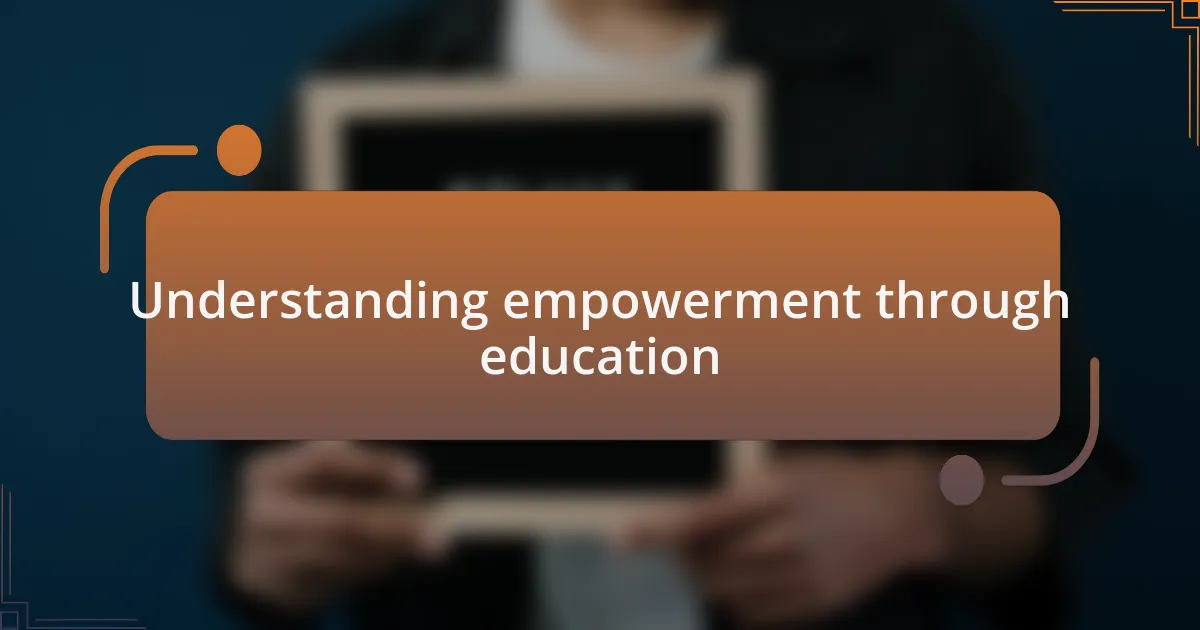
Understanding empowerment through education
Empowerment through education is a transformative experience that reshapes our understanding of ourselves and the world around us. I remember a time in school when a teacher encouraged me to voice my opinions during class debates. That moment ignited a desire in me to not only learn but to share my knowledge, which truly opened my eyes to the power of education as a tool for empowerment.
As I reflect on my journey, I often wonder: how many people have untapped potential because they lack access to education? It’s heartbreaking to think that education is still a privilege for many. When I volunteered with underprivileged youth, I realized that providing them with the right resources and guidance allowed them to believe in their abilities, ultimately fostering their self-esteem and motivation.
Education isn’t just about facts and figures; it’s about nurturing critical thinking and encouraging individuals to take charge of their futures. I’ve seen firsthand how teaching someone to think independently can spark a lifelong commitment to learning. When individuals feel empowered, they not only change their own lives but also inspire those around them to seek knowledge and pursue their dreams.
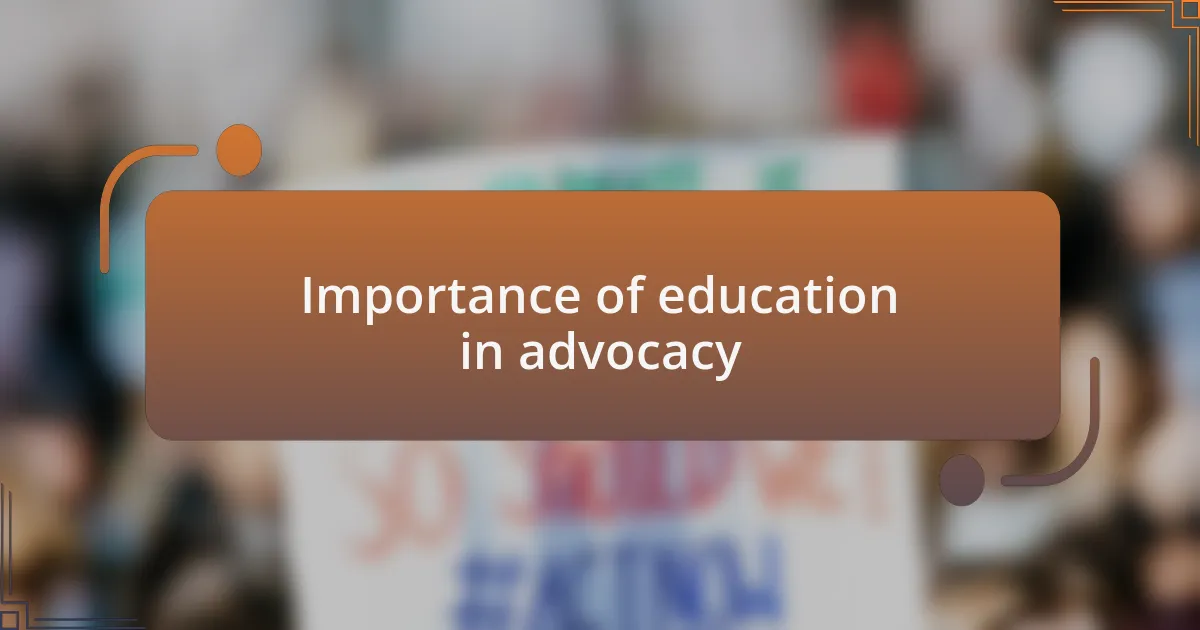
Importance of education in advocacy
Advocacy requires knowledge and understanding. I remember attending a pro-life seminar where the speaker detailed the ethical implications of every decision we make. This experience reinforced how education equips advocates with the information needed to argue their positions effectively and persuasively. Without a solid education, how can we expect to engage in meaningful dialogue?
I’ve found that being well-informed not only boosts confidence but also helps dispel myths and misconceptions. During discussions with peers, I often relied on research to clarify points about pro-life issues that some tried to oversimplify. This process taught me that education allows us to articulate our beliefs with clarity, making it easier to connect with others who may not share our views.
Furthermore, education fosters a sense of responsibility. When I delved into the statistics of maternal health, I felt compelled to share this knowledge within my community. It made me realize that empowered advocates aren’t just informed; they’re also driven to make a difference. How can we change the world if we remain silent? Each piece of knowledge we gain equips us to amplify voices that might otherwise go unheard.
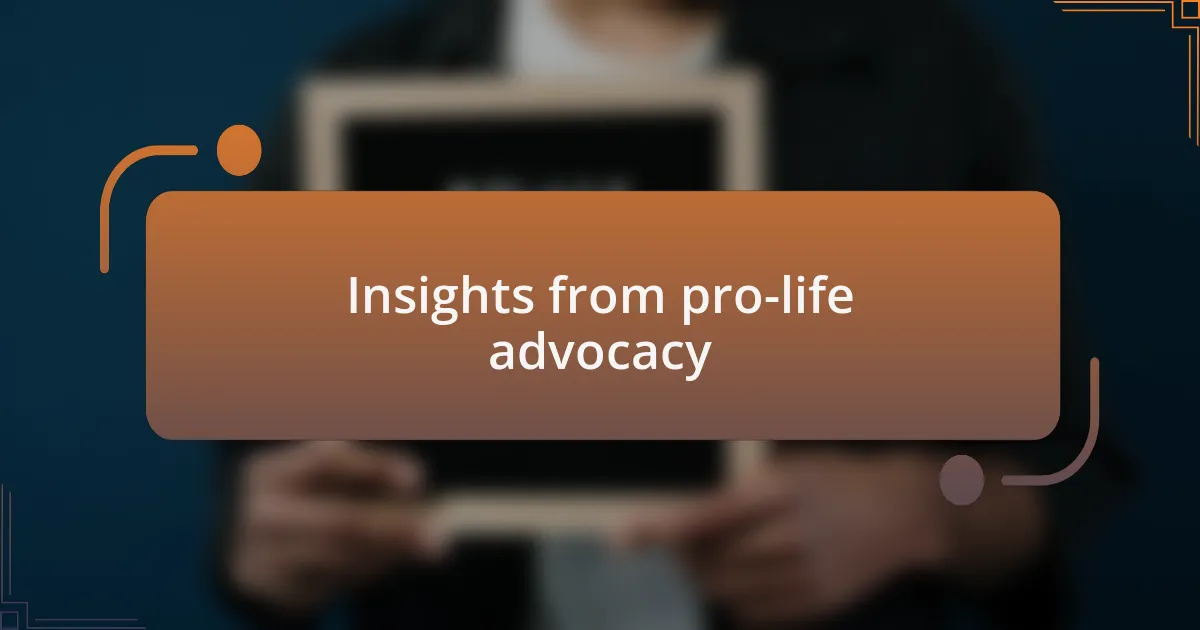
Insights from pro-life advocacy
I’ve learned that pro-life advocacy often reveals profound insights about the power of education. One evening, I found myself in a heated discussion about the role of alternatives to abortion, driven by what I had learned through workshops and discussions. In that moment, I realized that sharing accurate information can shift perspectives and open hearts, leading to more constructive conversations—not just about facts, but about hope and support.
The emotional weight of those revelations can’t be overstated. During a community outreach event, I witnessed a mother share her story of choosing life despite challenging circumstances. As she spoke, I understood how education had given her the strength to navigate those difficult choices. That moment truly illuminated for me how awareness can foster resilience and empower individuals to make informed decisions about their lives.
Engaging with others in the pro-life sphere underscores the importance of empathy intertwined with knowledge. I frequently ask myself: How can we effectively advocate for life unless we actively listen and educate ourselves about diverse experiences? It’s not just about presenting data; it’s about creating an environment where every voice feels valued and understood. This shift in perspective has transformed not only my approach to advocacy but has also deepened my commitment to fostering a well-informed community.
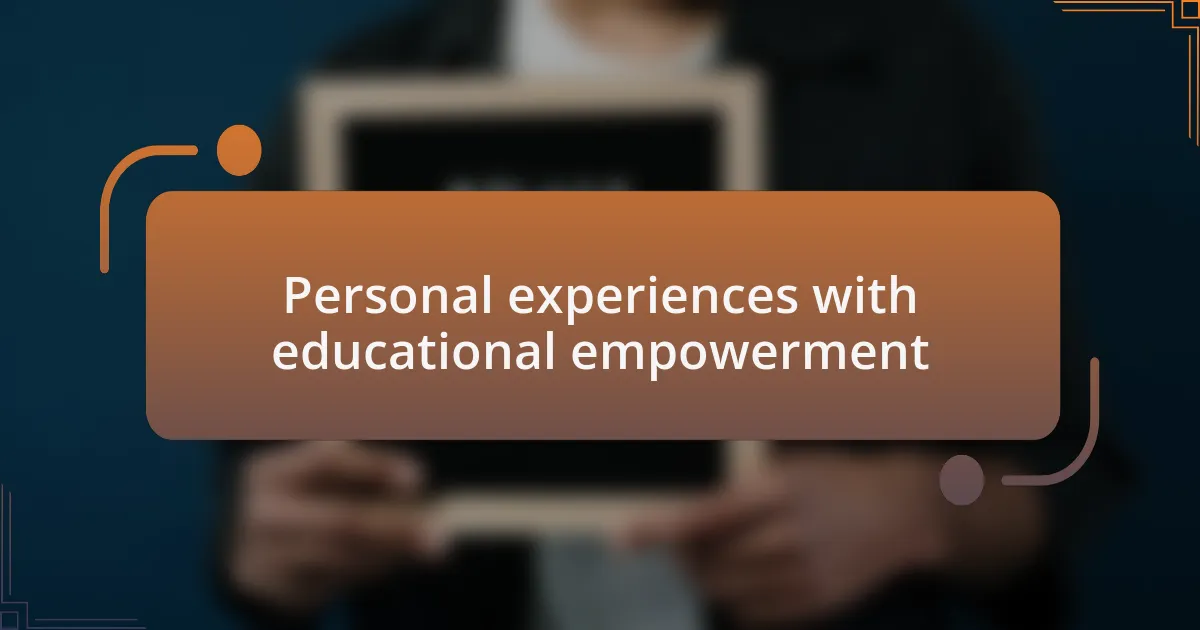
Personal experiences with educational empowerment
Experiencing educational empowerment has often taken me by surprise. I vividly recall a workshop where participants were encouraged to share their struggles and triumphs regarding pregnancy choices. Listening to those stories, I felt a powerful connection to the courage displayed by each individual. It made me realize that education doesn’t just inform; it resonates deeply, weaving a fabric of shared experiences that empowers us all.
There was a pivotal moment when I volunteered as a mentor for young women facing unplanned pregnancies. I remember one young woman in particular, who expressed her fears about her future. Through our discussions, I provided her with resources and information about her options. Watching her transform from uncertainty to confidence illuminated how educational support can ignite a sense of agency in someone’s life.
One question I continuously grapple with is: How can we better harness education to uplift others? To me, it’s about creating spaces where knowledge flows freely, fostering environments where difficult choices can be met with understanding and encouragement. Reflecting on these moments, I recognize that empowerment through education isn’t just about imparting knowledge; it’s about nurturing hope and resilience in those we aim to support.
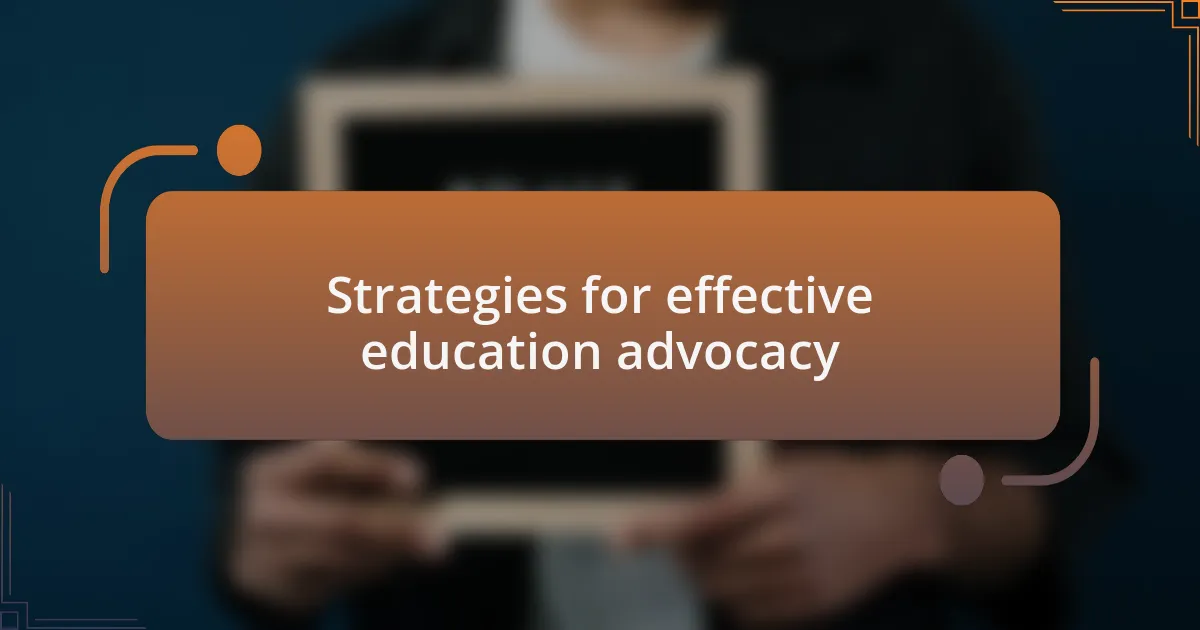
Strategies for effective education advocacy
One impactful strategy for effective education advocacy is to create interactive workshops that allow for open dialogue. I remember organizing a community event centered around health education where participants shared their personal journeys. Witnessing the vulnerability of the attendees opened my eyes to how such spaces can foster trust and facilitate learning, encouraging participants to engage with the material on a deeper level.
Another crucial strategy is to leverage storytelling as a tool for education. I often find that facts and statistics resonate less than real-life stories. For instance, during a presentation, I shared my own unexpected pregnancy experience, connecting it to statistics on education access. The room felt charged with emotion, and I realized that these narratives create empathy, allowing for a more profound understanding of complex issues.
Finally, collaboration with local organizations can amplify educational efforts. When we joined forces with a nearby women’s shelter, the results were astounding. The shelter staff brought invaluable insight into the needs of their clients, and together, we developed tailored workshops that addressed specific concerns. This taught me that when we align our resources and experiences, we can make the education advocacy more relevant and impactful for those we seek to empower.
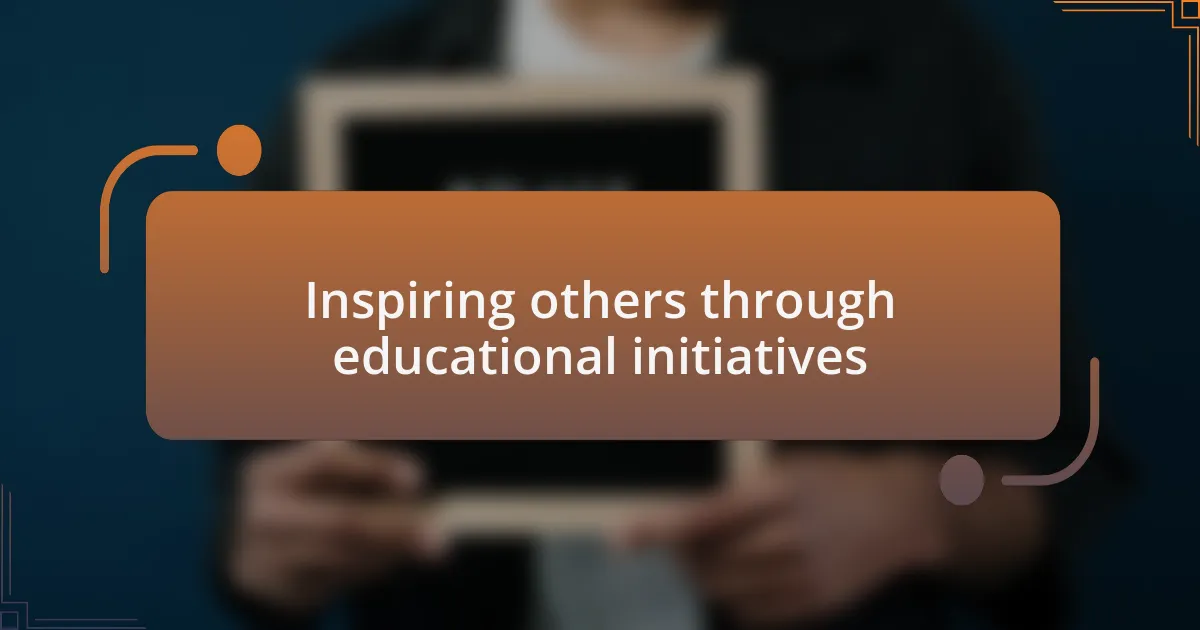
Inspiring others through educational initiatives
As I’ve engaged in various educational initiatives, one approach that truly resonated with me was the use of community storytelling circles. I recall a session where a participant bravely shared her story about seeking educational resources during a difficult time in her pregnancy. The way her words affected everyone in the room got me thinking—how often do we underestimate the power of shared experiences? In these moments, connection transforms mere information into something truly motivational.
I also found that creating mentorship opportunities can profoundly inspire others. I once worked with a group of young mothers aiming to return to school, and pairing them with mentors who had walked a similar path ignited a spark within them. Their eyes lit up with possibility as they realized they weren’t alone in their journey. Don’t you think having someone to guide you can change the course of your life in unexpected ways? It’s incredible how just a little bit of support can lead to significant transformations.
Moreover, I’ve observed the impact of integrating art into educational programs. At a recent workshop, we used art to express feelings about education and motherhood, which opened up a dialogue that statistics alone could not initiate. Watching participants create and then explain their artwork revealed deep insights and aspirations. It made me wonder—what other creative avenues could we explore to foster inspiration and empowerment in education? This creative approach not only promotes learning but also cultivates an environment where individuals feel valued and heard.